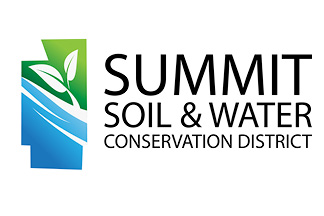Backyard conservation begins with ‘grasscycling’
Submitted by Summit Soil and Water Conservation District
Did you know that you could maintain a healthier lawn, save money and protect the environment all at the same time? “Grasscycling” is a healthy landscaping practice that simply means leaving your grass clippings on the lawn, instead of sweeping them into the street or bagging them for dumping in the nearest landfill.
When grass clippings end up in the street, they are picked up by stormwater runoff and carried down the storm drain path into the nearest stream or lake. There, they introduce excess nitrogen into surface waters, causing algal blooms. When the algae decompose, they use up all of the available oxygen, and fish and aquatic animals cannot survive.
We also dump over four million tons of grass clippings and other yard waste into landfills annually. The collection and disposal cost is about $100 per ton; so keeping grass clippings on the lawn is both environmentally and economically sound.
Grass clippings are a valuable organic product, which can add vigor and durability to your lawn. Clippings left on the lawn recycle nutrients, saving you about 25% of your annual fertilizer costs. Every garbage bag full of grass clippings contains up to one-quarter pound of usable nitrogen, a valuable soil nutrient. You can avoid or eliminate the use of fertilizers and other lawn chemicals by allowing soil organisms to return these nutrients to the soil.
Grasscycling is an uncomplicated, affordable lawn care practice. Mow your grass when it is dry and keep it 3-4 inches high. This method puts more nutrients into the roots, allowing your lawn to have a larger and deeper root system, which will protect it against weeds and droughts. Keep mower blades sharp. By mid-summer, mower blades have become dull, and this causes stress to the lawn. A sharp blade and frequent mowing will produce finer clippings that will decompose quickly.
Leaving the clippings on the lawn also reduces mowing time by 25-30%. You will also eliminate raking, emptying mower bags, trips to the curb and purchasing lawn trash bags. You don’t have to worry about an unsightly appearance, because frequent mowing or using a mulching mower produces short clippings which disappear rapidly, since the mowed blades of grass are recut and forced down into the base of the lawn.
If you want to collect your clippings occasionally, you can recycle them as mulch in the garden or in planting beds. Avoid mulching with clippings that have been recently treated with herbicides, however, because they can harm your landscape plants. Chemically treated clippings should be left on the lawn or composted where herbicides will break down.
For more information on these and other healthy landscaping practices, call Summit Soil and Water Conservation District at 330-929-2871. ∞

